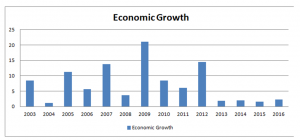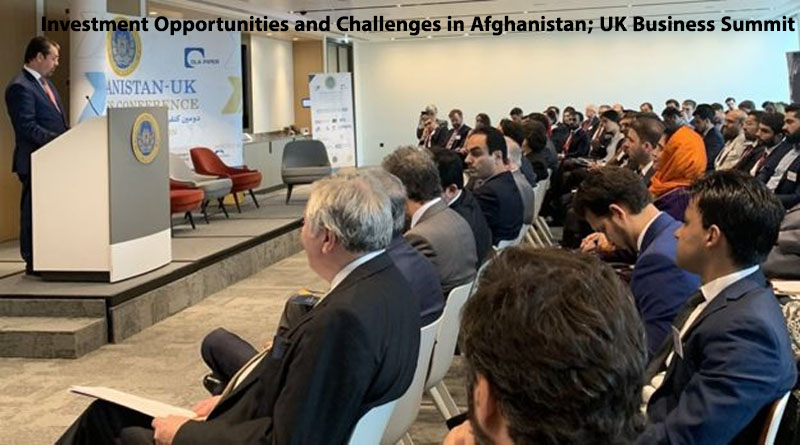Investment Opportunities and Challenges in Afghanistan; UK Business Summit
The second Afghan-British Business Summit on Monday 13October in London by the Embassy of the Islamic Republic of Afghanistan in the UK, in close cooperation with the Afghan and British International Chambers of Commerce, launched the second and largest economic and business forum between Afghanistan and the United Kingdom.
The meeting was attended by Afghan business leaders, British, European, American and Afghan investors residing in the UK. The meeting was attended by senior Afghan government officials, including the Ministry of Economy, Mines, Trade, Agriculture and Livestock and Energy, and encouraged Western investors to invest in Afghanistan.
In this week’s analysis with the purpose of the London Economic Summit, the background of the two countries’ relations, and how well Afghanistan is fit for investment.
The Afghan – British relations after NUG
UK is one of the significant donors for the Afghanistan development programs, In December 2014, London also hosted a summit of the countries supporting Afghanistan, at the meeting, the Afghan National Unity Government presented its program to the international community under the name “Towards Self-Sufficiency” and the participating countries reaffirmed their continued commitment to Afghanistan at the Tokyo Summit (2012). At the meeting, the British government pledged to provide $ 270 million annually in aid to Afghanistan by 2020, as in previous years. The UK has also worked with the Afghan government on capacity building in Afghan departments, including the Ministry of Economy and Finance, museum management, archaeological preservation, strengthening of small businesses and counter-narcotics.
The Aim of summit
The purpose of the recent London meeting was to focus on trade and investment, in addition to expanding trade between Afghanistan and UK, In addition, setting up Afghan products for sale in UK markets, encouraging British investors to invest in Afghanistan’s mines, agriculture and power generation sectors, as well as providing information on Afghan government action to improve conditions. Economic and foreign investment attraction included agenda items. Introducing business and investment opportunities in Afghanistan, where investing in Afghan carpets, precious stones and jewelry, was another focus of the meeting. Sayed Tayeb Jawad, Afghanistan’s ambassador to the UK said the difference between the meeting and the first meeting last year was focusing more on new areas such as banking, insurance and financial institutions. At the meeting, a number of international investors working in Afghanistan described their investment experiences in Afghanistan: “The devaluation of the Afghan currency against foreign currencies, the decline in per capita income, the decline in development budgets in the infrastructure sector and the increase in the population below the poverty line in Afghanistan have faced serious challenges in the past few years.” But the Afghan side has reminded few of the economic gains of the national unity government, boosting government revenue, expanding regional transport lines, expanding energy transmission projects, boosting agricultural production and improving business climate in Afghanistan.
Is Afghanistan ready for investment?
Domestic investors are becoming more cautious these days in Afghanistan; even government officials confirm that capital owners transfer their money abroad every day, these are all the results of the worries that the current political and security situation in the country has created. Economic officials in Afghanistan are now working to make it easier for them to attract foreign investment to make up for the shortfall. For this reason, the London International Chamber of Commerce organized an investment fundraiser in London in collaboration with the British International Chamber of Commerce and the Afghan Embassy in London. Officials said more than 3 European companies and 3 international companies attended the meeting. The participants were from the United Kingdom, Germany, France, Italy and the United States. According to official reports, the UK has increased its involvement in the development of Afghanistan. European companies are implementing several projects in the country, and the strategic partnership agreement between Afghanistan and European countries includes cooperation in trade, economic development, agriculture, mining and capacity building. Mustafa Mastor, the Afghan economy minister, said while his country’s investment situation is under threat from the opposition, his government is determined to provide adequate security to foreign investors, Foreign investors can invest in five sectors in Afghanistan, one of the major sectors for attracting foreign investment in Afghanistan is the Afghan mines sector, a joint US Department of Defense and US Geological Survey estimates that underground copper deposits Iron, niobium, lithium and gold in Afghanistan are worth more than a trillion dollars. Although investments have been made in Afghanistan’s mining sector, it has not yet been successful.
Afghanistan unbalanced Economic growth
Between 2001 and 2012 Afghanistan’s economic growth was an average of 9%. During this time, in 2009 Afghanistan had the highest economic growth, 21%. Nonetheless, after 2009 until 2018, the country did not have a remarkable economic growth. In 2010, 2011, 2012, 2013, 2014, 2015, 2016, 2017 and 2018 Afghanistan’s economic growth was respectively 8.4%, 6.1%, 14.4%, 1.9%, 2%, 1.5%, 2.2%, 2.7% and 2.2%
Chart-1: Afghanistan’s economic growth 2003-2018

Source: website; World Bank and Asian Development Bank
The reason behind a remarkable economic growth in 2009 is relatively favorable security and economic situation in Afghanistan in the years before it. On the other hand, before this year, the issue of foreign forces’ withdrawal from the country was not raised either. Nevertheless, except for 2012 in which the economic growth was 14.4% and the reason behind which was an increase in the agricultural products, since 2009 the country’s economic growth rate is dropping
Conclusion
Although the UK ended the war in Afghanistan after 2014, and continued its development assistance, and their relations with Afghanistan have previously deteriorated, in the current context of the second Afghan Business and Investment Summit in the UK It shows the expansion of Afghanistan’s relations with important and developed countries of the world. The government is trying to keep Afghanistan’s relations with the donor countries warmer and to draw the world’s attention to help Afghanistan.
UK is a developed country with a trade and agriculture-based economy. This country has vast experiences in fields of agriculture, livestock, and mining and can share these experiences with Afghanistan. The Afghan officials also discussed water management with UK experts. Since Afghanistan has vast water resources, UK cooperation in this field could be helpful for Afghanistan. Besides participation in constructing water dams, UK is also interested in working in the mining field in Afghanistan, and if UK plays a direct role in mining in Afghanistan, it will be fruitful for the economic development of the country.

